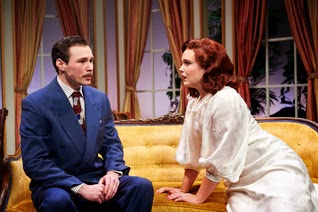If
you’re a lover of chocolate or coconut cream pie, you’re keenly aware that an
upper crust is not only unnecessary but something of a blight on an otherwise tasty
treat.
Some
might say the same thing about the upper crust in society, that amalgam of 1
percenters who live off inherited wealth and swan gracefully from drawing room
to sitting room all day long. These are the folks who populate The Philadelphia Story by Philip Barry,
and happily this upper crust doesn’t turn soggy under the sharp direction of
Jerrold Scott (who also doubles amusingly as Uncle Willie).
This
1939 play, which was famously adapted for Hollywood, combines sophisticated and
screwball comedy to a fare-thee-well. And Barry is a master of the rat-a-tat,
knife-edge dialogue that fueled so many comedies of that era.
Of
course, the set-up is custom-tailored for laughs. The arrogant and feisty
heiress Tracy Lord, who is anticipating her marriage the next day to stuffy
George Kitteredge, is suddenly confronted by both her suave ex-husband Dexter
and a sly reporter, Macauley. Soon, Tracy’s well-cosseted hormones are flying
in all directions and it’s unclear where they’ll eventually perch.
The
witticisms come at you fast and furious, but they usually reward careful
listening. As when George says: “But a man expects his wife to—“ and Tracy
completes the sentence: “Behave herself. Naturally.” To which Dexter appends,
“To behave herself naturally.” That little pause, or lack thereof, makes all
the difference.
The
cast, made up primarily of CWRU students, handles this precious wordplay well.
The rapid delivery feels a bit forced in the first act, but once the performers
get their feet under them, their pace begins to fit the script quite nicely.
In the
linchpin role of Tracy, Kathryn Metzger has both the arch rectitude and the
sliver of anarchic spirit that Katherine Hepburn displayed on stage and screen.
As Macauley, Jeremiah Clapp has the lean look of a young Fred Astaire (minus
the fancy footwork), as he pursues Tracy. And Alec Hynes lends some Cary
Grant-style suavity to Dexter, smoothly circling the comical chaos and planting
tender memories until he’s ready to make his move.
Also
entertaining are Megan King as Tracy’s teenage sister Dinah, she of the
impetuous gestures and repeatedly mangled syntax, Katie O. Solomon as snarky
paparazzi Elizabeth, and Erin Bunting as the girls’ matronly mom. Not so
successful are Nick Barbato, who never quite embodies pater familias Seth Lord,
and Rickie McDowell’s indifferently rendered George.
It’s
a shame the theatrical versions of this show don’t include the famous prelude
to the film—Tracy breaking Dexter’s golf club over her knee, Dexter responding
by pushing her down with his open hand to her face. Sure, it ain’t PC, but boy
is it funny.
However,
thanks to Cameron Caley Michalak’s lush set and Jeffery Van Curtis’ tasteful
costumes, the play looks as good as it sounds. And thanks to Barry’s clever
words (”I would sell my grandmother for a drink, and you know how much I love
my grandmother”), this Philadelphia Story
is a yarn worth hearing again.
The
Philadelphia Story
Through
March 7 at PlayhouseSquare, the Helen Rosenfeld Lewis Bialosky Lab Theatre,
1516 Euclid Avenue, 216-241-6000.




